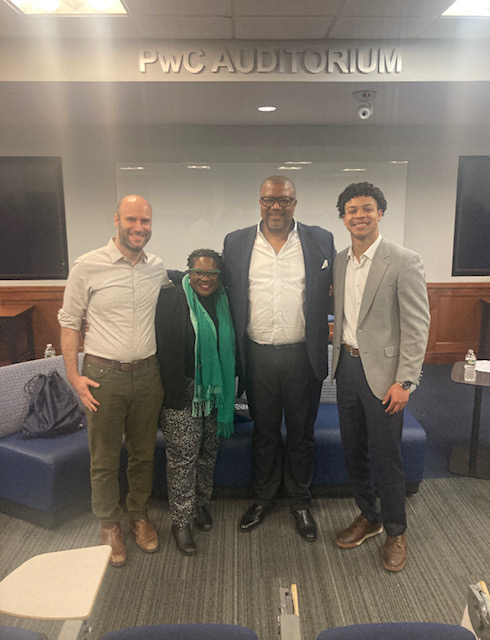Last Thursday, Feb. 13, the Villanova School of Business (VSB) Office of Diversity, Equity and Inclusion (ODEI) hosted the latest in its Spotlight Speaker Series, “Elevating Black Voices: Social Consciousness and Allyship in the Workplace,” in celebration of Black History Month. Students from all walks of life gathered in Bartley Hall’s PWC Auditorium to attend an enriching discussion about the meaning of DEI.
“The lowest-hanging fruit for me is that DEI is no longer used in this coded, almost slur-like way in our natural conversation,” said Reverend Naomi Washington-Leaphert, professor in Villanova’s Theology & Religious Studies Department. “We’re sacrificing a great deal when we dismiss equality and inclusion.”
The event was moderated by Bryce Ettrick, VSB senior and member of the National Association of Black Accountants (NABA). The guest speakers consisted of Washington-Leaphert, Dr. Rory Kramer from the College of Liberal Arts and Sciences (CLAS) and Ken Bouyer, Director of Inclusiveness Recruiting for the accounting firm Ernst & Young.
The first question posed was about how the speakers have used their professional experiences to elevate black voices. Kramer responded that part of it is to recognize his own position, because it colors how people think about his words and actions.
“Did I make this room more open and more safe for people who are not like me?” Kramer said. “Because people like me are safe.”
He also states that elevating the voices of anyone, regardless of race, gender, sexual orientation or ability, revolves around holding everyone accountable to the ideals that one cares about. That often means taking the initiative to advocate for fair treatment before anyone else does, not just waiting for someone being discriminated against to bring attention to a cause. One who does it poorly once should strive to do better next time.
The second question asked how the speakers aim to build more inclusive workspaces. Bouyer states that the goal is to make sure all voices are heard and that all perspectives are taken into account. Decisions made with the consideration of how they will affect everyone in a company or community will be most to everyone’s collective benefit.
What Bouyer likes to do to increase inclusion and elevate voices is to share his perspective as a black man. It allows people to understand how he grew up, where he came from, and who he is. This builds understanding for his experiences, but most of all, it builds empathy for his plights.
“You can’t have empathy for what you don’t have proximity to,” Bouyer said, implying that empathy is the key that unlocks the door to change.
The third question was how workplace dynamics and corporate culture affect people. The speakers focused on the narrative of DEI and how recent changes in America’s structure have shifted the narrative.
With these changes, there are some organizations all across America that have pulled the plug on creating embracive environments for workers. Others are doing modifications to their policies, but still very much doing the work, either good or bad. Kramer stated that schools are changing the names of programs or stopping them entirely because they are afraid to be in the spotlight.
“For a lot of white guys, it’s the first time they’ve been put in the cart,” Kramer said.
Washington-Leaphert said that she believes those with privilege are afraid of losing that privilege, along with the power that comes with it, so they aim to push back against DEI.
The fourth question was how white students can be helpful in promoting diversity and what true allyship looks like.
It can mean being that co-worker who gives the only black person in the room the courage to speak up. It can mean asking someone how they want to be involved or who they want to speak up if you are advocating for them.
It can mean, as Washington-Leaphert suggested, “shifting the mundane” with how we interact with others daily. Even something like bringing attention to the fact that the syllabus only uses materials created by white scholars is a big step.
Finally, the fifth question was who the speakers believe are the stewards in currently challenging DEI, with the speakers agreeing that anyone can and should be a steward.
You must ask yourself what diversity means to you and then use that as a rallying cry to demand what you want. You must be willing to subvert systems and lessons you grew up with. Most importantly, just as Kramer says, you must find your role.
“If you speak, do speeches,” Kramer said. “If you notice those who aren’t involved and you know how to bring them in, then that’s your role. Find that role that you’re good at and don’t let anyone take that role away from you.”







